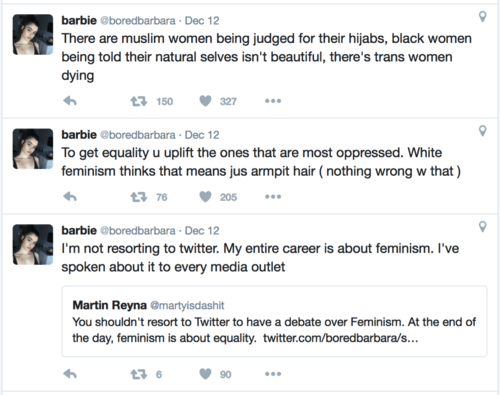Barbie Revisited
As a teenage girl who has had a consistent, though definitively low key, internet presence since I was 12, I have witnessed the rise and fall of many-a carefully tailored persona. Online venues (Tumblr being the most recent and preeminent, but MySpace before this) provide a space for young people to pick the best bits and pieces of themselves, and to cut and paste them together into some straw man fallacy of a person. As a gawky preteen who spent, admittedly, too much time online, these designer identities became my model of Teenage/Young Adult/Meandering 20-Something Life and, retrospectively, this was bad. I wish so deeply that I could be in that weird, awkward Internet-icon-seeking stage of my life now, because I would have found Barbara, “Barbie”, Ferreira.
Barbie is a nineteen year old curve model from the greater New York City area, and an unabashedly outspoken intersectional feminist:
She is, by definition, an internet icon, though that term is seemingly all encompassing — over 50,000 followers? Automatic icon, right? — but Barbie’s internet presence is not vague, it is very specific. To be an icon you have to do something different, and in a changing, more intersectional internet space, Barbie has cemented herself as a key part of the body positive movement. She has done this through abject self love; posting selfies wherein she feels confident, sharing photos of her friends and lifting them up as her own beauty icons. Barbie is an icon of the body positive movement because she uses her platform to provide representation to women whose sizes and colors aren’t widely seen and portrayed as beautiful.
The feminist movement within itself has always been hinged on the idea of the personal as political, and the body positive movement ties in closely with this idea as the entire premise is self-love as an act of radical caring. To be open and vulnerable as a woman also qualifies itself as radical, and when this concept of vulnerability is combined with learning to love oneself, something magical happens.
The platform that Barbie has is impressive. She has a collective following of 266,500 followers on Instagram and Twitter and thousands more on Tumblr. She has signed to Wilhelmina Models, has been published in magazines, adorned gallery walls, and has formed one of the most formidable feminist friendships of our age with the photographer, Petra Collins. The stage that Barbie has built for herself makes her statements about feminism and body positivity even more impactful. She has offered an accessible and authentic pathway for young girls to express themselves, and to express appreciation and love for girls who may not fit into mainstream media’s definition of what is beautiful.
The days of my internet youth seem to be long gone; the days of photoshopped skinny-ness for the sake of skinny-ness ruling social media outlets have ended. Instead, young girls are presented with the antithesis of what my original idea of an internet persona was (an idealized one); they are presented with authenticity and thick girls with thick thighs who love the way that they look, or, more importantly, are learning to love the way that they look.
However, honesty and self-love combined form a new kind of radical caring. This is a radical caring that lifts girls up who don’t have visibility in mainstream America, and this radical caring is what has managed to make the internet the petri dish of feminism. The ability for girls to retweet, reblog, and repin moments when they feel beautiful is incredibly important. Reposting enables girls to elevate girls; it offers a way in which to say, “I feel beautiful,” and for others to respond with, “Yes, you are beautiful.”
The faces of feminism and activism are changing. A radical act can be committed from the security of a bedroom as well as from marching in the streets or educating in a classroom. As I witness Barbie’s rise through tweets and Instagram photos, I cannot help but smile. I cannot help but smile at the thought of girls learning to love what they look like, and learning to tell others that they love what they look like too.
This piece was written as part of JWA’s Rising Voices Fellowship.








